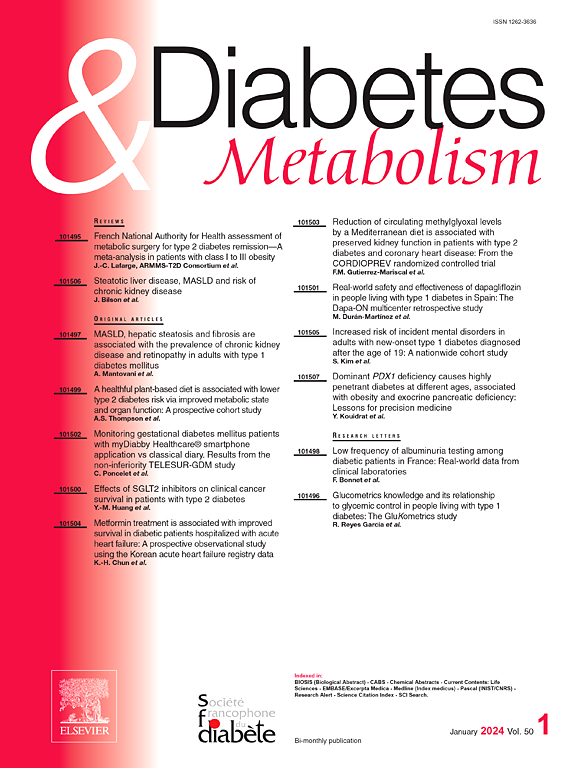Comparative effectiveness of SGLT2 inhibitors and GLP-1 receptor agonists in preventing Alzheimer's disease, vascular dementia, and other dementia types among patients with type 2 diabetes
IF 4.7
2区 医学
Q1 ENDOCRINOLOGY & METABOLISM
引用次数: 0
Abstract
Background
Type 2 diabetes mellitus (T2DM) is associated with an elevated risk of dementia, including Alzheimer's disease (AD) and vascular dementia (VaD). While sodium-glucose cotransporter-2 (SGLT2) inhibitors and glucagon-like peptide-1 (GLP-1) receptor agonists have shown neuroprotective potential, comparative data on their efficacy in dementia prevention remain scarce.
Methods
- We conducted a retrospective cohort study using the TriNetX database, including 307,103 SGLT2 inhibitor users and 348,686 GLP-1 receptor agonist users with T2DM. Propensity score matching yielded 221,883 pairs with balanced baseline characteristics. The primary outcome was overall dementia incidence, with secondary outcomes including AD, VaD, and all-cause mortality. Hazard ratios (HRs) were calculated using Cox proportional hazards models.
Results
SGLT2 inhibitors were associated with a significantly lower incidence of overall dementia compared to GLP-1 receptor agonists (2.7 % vs. 3.6 %; HR, 0.92; 95 % CI, 0.89–0.95). The risk of VaD (HR, 0.89; 95 % CI, 0.84–0.95) and AD (HR, 0.90; 95 % CI, 0.86–0.94) was also reduced with SGLT2 inhibitors. All-cause mortality was lower in the SGLT2 group (3.6 % vs. 4.6 %; HR, 0.95; 95 % CI, 0.92–0.98). No significant difference was observed in other dementia subtypes (HR, 0.96; 95 % CI, 0.91–1.01).
Conclusions
In this large, real-world cohort, SGLT2 inhibitors demonstrated superior efficacy over GLP-1 receptor agonists in reducing the risks of overall dementia, VaD, and AD among patients with T2DM. These findings support the preferential use of SGLT2 inhibitors in mitigating dementia risk in this population, though randomized controlled trials are warranted for confirmation.
SGLT2 抑制剂和 GLP-1 受体激动剂在预防 2 型糖尿病患者阿尔茨海默病、血管性痴呆和其他痴呆类型方面的疗效比较。
背景:2型糖尿病(T2DM)与痴呆风险升高相关,包括阿尔茨海默病(AD)和血管性痴呆(VaD)。虽然钠-葡萄糖共转运蛋白-2 (SGLT2)抑制剂和胰高血糖素样肽-1 (GLP-1)受体激动剂已经显示出神经保护潜力,但它们在预防痴呆方面的疗效的比较数据仍然很少。方法:。我们使用TriNetX数据库进行了一项回顾性队列研究,包括307,103名SGLT2抑制剂使用者和348,686名GLP-1受体激动剂使用者。倾向评分匹配产生221,883对具有平衡基线特征的配对。主要结局是总体痴呆发病率,次要结局包括AD、VaD和全因死亡率。采用Cox比例风险模型计算风险比(hr)。结果:。-与GLP-1受体激动剂相比,SGLT2抑制剂与总体痴呆发病率显著降低相关(2.7% vs 3.6%;人力资源,0.92;95% ci, 0.89-0.95)。VaD风险(HR, 0.89;95% CI, 0.84-0.95)和AD (HR, 0.90;95% CI, 0.86-0.94)也降低了SGLT2抑制剂。SGLT2组的全因死亡率较低(3.6% vs. 4.6%;人力资源,0.95;95% ci, 0.92-0.98)。其他痴呆亚型无显著差异(HR, 0.96;95% ci, 0.91-1.01)。结论:。在这个庞大的现实世界队列中,SGLT2抑制剂在降低T2DM患者总体痴呆、VaD和AD风险方面表现出优于GLP-1受体激动剂的疗效。这些发现支持优先使用SGLT2抑制剂来减轻该人群的痴呆风险,尽管需要随机对照试验来证实。
本文章由计算机程序翻译,如有差异,请以英文原文为准。
求助全文
约1分钟内获得全文
求助全文
来源期刊

Diabetes & metabolism
医学-内分泌学与代谢
CiteScore
12.00
自引率
4.20%
发文量
86
审稿时长
13 days
期刊介绍:
A high quality scientific journal with an international readership
Official publication of the SFD, Diabetes & Metabolism, publishes high-quality papers by leading teams, forming a close link between hospital and research units. Diabetes & Metabolism is published in English language and is indexed in all major databases with its impact factor constantly progressing.
Diabetes & Metabolism contains original articles, short reports and comprehensive reviews.
 求助内容:
求助内容: 应助结果提醒方式:
应助结果提醒方式:


